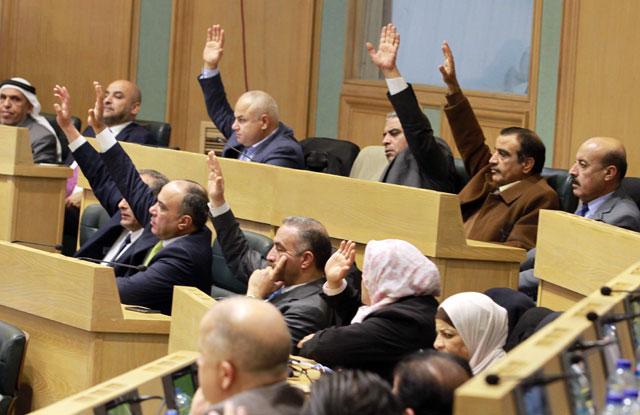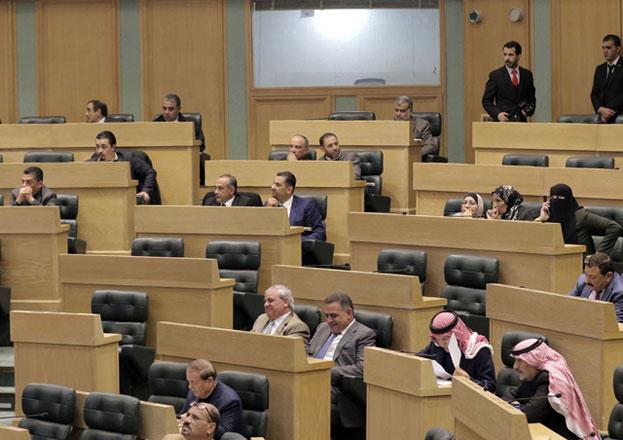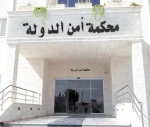You are here
2019 budget bill passed by Lower House after four days of deliberations
By JT - Jan 03,2019 - Last updated at Jan 03,2019

Deputies are seen taking a vote on the 2019 state budget draft law at the Dome on Thursday (Photo by Hassan Tamimi)
AMMAN — The Lower House passed the 2019 state budget draft law Thursday evening with a majority of 60 votes out of the 105 attending MPs, while the draft for the year’s budgets of independent public institutions passed with 65 votes.
The MPs endorsed the recommendations of the Lower House’s Finance Committee on the draft laws after deliberations that dragged on for four days, over seven sessions, during which 105 MPs took to the podium, the Jordan News Agency, Petra, reported.
Some legislators criticised the budget, saying that it contradicts the government’s goal of a productive state and that the government is still adopting a policy of “money collection”, rather than production.
Regarding independent public institutions, a number of MPs labelled them as a “burden” on the Treasury and called on the government to dissolve them, while others suggested merging them, Petra added.
Deputies also stressed the need to support medical and educational tourism, saying that Aqaba Governorate receives “huge” support, with “negligible” contribution to the GDP.
According to the budget draft law, GDP is expected to increase by 2.3 per cent, 2.5 per cent and 2.7 per cent in 2019, 2020 and 2021 respectively.
The bill submitted to the House estimated the volume of local revenue in 2019 to reach JD8.01 billion, with an increase of 14.8 per cent from 2018, the reason being primarily attributed to the rise in tax and non-tax revenues, by 15.9 per cent and 12.9 per cent, respectively.
Tax revenues are estimated for the entirety of 2019 at JD5.273 billion, of which income tax revenues would constitute JD3.61 billion, with customs revenue estimated at JD365 million and property sale tax at JD110 million, while revenues from sources other than taxation would reach JD2.737 billion.
Minister of Finance Ezzeddine Kanakrieh, who read the government’s response to MPs’ queries during Thursday’s session, noted that the preliminary and final financial statements for 2018 showed that the deficit narrowed to reach some JD730 million or 2.4 per cent of the GDP, compared with JD748 million or 2.6 per cent in 2017 and considerably less than the reestimated JD814-million deficit in 2018.
The financial statements also showed that the public debt’s percentage to the GDP dropped from 94.3 per cent in 2017 to about 94 per cent at the end of 2018.
However, many MPs pointed out that the 2019 budget had overestimated local revenues, as they were expected to grow from their reestimated level of 2018 by about JD1.035 billion or 14.8 per cent, of which JD245 million would come from income tax, JD400 million from sales tax, JD72 million from customs and JD312 million from non-tax sources.
The government’s response also tackled the estimated grants for 2019, explaining that the 2019 draft budget had only taken into consideration the value of the committed grants, which were estimated at JD600 million, while projections indicated that the value would increase by JD200 million.
In response to deputies’ arguments, Prime Minister Omar Razzaz said that the government’s priorities this year aim at controlling the deficit through balancing local revenues and current expenditure.
The premier also said that a national employment project will be launched next week, in addition to planned improvements in education, health and transportation services, in addition to infrastructure, with each having their own allocations in the budget.
He added that the government counts on its partnership with the private sector to implement joint projects, noting that the priority is given to local enterprises. He also said that MPs’ comments “reflect the difficult situation that the Jordanians are going through”.
Razzaz stressed that the government would take MPs’ comments into consideration and work on incorporating as much of them as possible this year and postpone others to the next year.
Related Articles
AMMAN — The Lower House is scheduled to listen to the government’s presentation of the 2020 draft state budget law on Sunday, Speaker
AMMAN — Domestic revenues estimated in the draft 2019 state budget law are "a lot exaggerated" as they exceed the expected 4.8 per cent grow
AMMAN — The Lower House on Wednesday continued its deliberations over the 2019 state budget draft law and the budgets of independent public
















